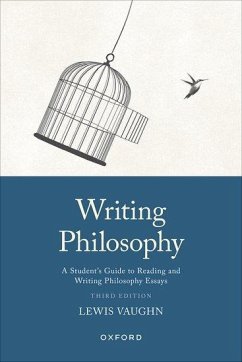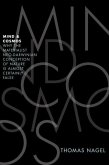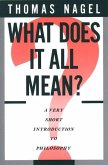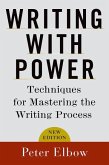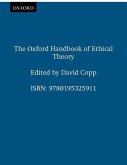- Broschiertes Buch
Andere Kunden interessierten sich auch für
![The Body in Pain The Body in Pain]() Elaine Scarry (Associate Professor Associate Professor of EnglishThe Body in Pain20,99 €
Elaine Scarry (Associate Professor Associate Professor of EnglishThe Body in Pain20,99 €![Mind and Cosmos Mind and Cosmos]() Thomas Nagel (University Professor of Law and Universit PhilosophyMind and Cosmos47,99 €
Thomas Nagel (University Professor of Law and Universit PhilosophyMind and Cosmos47,99 €![What Does It All Mean? What Does It All Mean?]() Thomas Nagel (Professor of Philosophy, Professor of Philosophy, NewWhat Does It All Mean?12,99 €
Thomas Nagel (Professor of Philosophy, Professor of Philosophy, NewWhat Does It All Mean?12,99 €![Seeing Things as They Are Seeing Things as They Are]() John Searle (Willis S. and Marion Slusser Professor of PhilosophySeeing Things as They Are48,99 €
John Searle (Willis S. and Marion Slusser Professor of PhilosophySeeing Things as They Are48,99 €![Writing With Power Writing With Power]() Peter Elbow (Professor of English, Professor of English, UniversityWriting With Power23,99 €
Peter Elbow (Professor of English, Professor of English, UniversityWriting With Power23,99 €![The Oxford Handbook of Ethical Theory The Oxford Handbook of Ethical Theory]() David Copp (ed.)The Oxford Handbook of Ethical Theory63,99 €
David Copp (ed.)The Oxford Handbook of Ethical Theory63,99 €![Technology and the Virtues Technology and the Virtues]() Shannon Vallor (S.J S.J. Professor in the Department of PhilosophyTechnology and the Virtues92,99 €
Shannon Vallor (S.J S.J. Professor in the Department of PhilosophyTechnology and the Virtues92,99 €-
-
-
Produktdetails
- Verlag: Oxford University Press Inc
- 3 Revised edition
- Seitenzahl: 192
- Erscheinungstermin: 18. Dezember 2023
- Englisch
- Abmessung: 141mm x 210mm x 9mm
- Gewicht: 208g
- ISBN-13: 9780197751916
- ISBN-10: 0197751911
- Artikelnr.: 68208361
Hinweis: Dieser Artikel kann nur an eine deutsche Lieferadresse ausgeliefert werden.
- Herstellerkennzeichnung
- Libri GmbH
- Europaallee 1
- 36244 Bad Hersfeld
- gpsr@libri.de
Lewis Vaughn is the author or coauthor of numerous books, including The Power of Critical Thinking, Seventh Edition (2022); Philosophy Here and Now, Fourth Edition (2022); Writing Philosophy, Second Edition (2018); and Living Philosophy, Third Edition (2021), all published by Oxford University Press.
* Preface * Part 1 Reading and Writing * 1: How to Read Philosophy * What is Philosophy? * Reading Philosophy *
Rule 1
1 Approach the Text with an Open Mind *
Rule 1
2 Read Actively and Critically *
Rule 1
3 Identify the Conclusion First, Then the Premises *
Rule 1
4 Outline, Paraphrase, or Summarize the Argument *
Rule 1
5 Evaluate the Argument and Formulate a Tentative Judgment * Writing a Paraphrase or Summary * Applying the Rules * 2: How to Read an Argument * Premises and Conclusions * Judging Arguments *
Rule 2
1 Know the Basics of Deductive and Inductive Arguments *
Rule 2
2 Determine Whether the Conclusion Follows from the Premises *
Rule 2
3 Determine Whether the Premises Are True * Applying the Rules * 3: Rules of Style and Content for Philosophical Writing *
Rule 3
1 Write to Your Audience *
Rule 3
2 Avoid Pretentiousness *
Rule 3
3 Keep the Authority of Philosophers in Perspective *
Rule 3
4 Do Not Overstate Premises or Conclusions *
Rule 3
5 Treat Opponents and Opposing Views Fairly *
Rule 3
6 Write Clearly *
Rule 3
7 Avoid Inappropriate Emotional Appeals *
Rule 3
8 Be Careful What You Assume *
Rule 3
9 Write in First Person *
Rule 3
10 Avoid Discriminatory Language * 4: Defending a Thesis in an Argumentative Essay * Basic Essay Structure *
Introduction *
Argument Supporting the Thesis *
Assessment of Objectives *
Conclusion *
A Well
Built Essay * Writing the Essay: Step by Step *
Step 1 Select a Topic and Narrow It to a Specific Issue *
Step 2 Research the Issue *
Step 3 Write a Thesis Statement *
Step 4 Create an Outline of the Whole Essay *
Step 5 Write a First Draft *
Step 6 Study and Revise Your First Draft *
Step 7 Produce a Final Draft * An Annotated Sample Paper * 5: Avoiding Fallacious Reasoning * Straw Man * Appeal to the Person * Appeal to Popularity * Appeal to Tradition * Genetic Fallacy * Equivocation * Appeal to Ignorance * False Dilemma * Begging the Question * Hast Generalization * Slipper Slope * Composition * Division * 6: Using, Quoting, and Citing Sources *
Rule 6
1 Know When and How to Quote Sources *
Rule 6
2 Do Not Plagiarize *
Rule 6
3 Cite Your Sources Carefully *
Rule 6
4 Build a Bibliography if Needed * Part 2 Reference Guide * 7: Writing Effective Sentences *
Rule 7
1 Make the Subject and Verb Agree in Number and Person *
Rule 7
2 Express Parallel Ideas in Parallel Form *
Rule 7
3 Write in Complete Sentences, Not Fragments *
Rule 7
4 Connect Independent Clauses Properly *
Rule 7
5 Delete the Deadwood *
Rule 7
6 Put Modifiers in Their Place *
Rule 7
7 Be Consistent in Tense, Voice, Number, and Person *
Rule 7
8 Communicate Pronoun References Clearly * Exercises: Writing Effective Sentences * 8: Choosing the Right Words *
Rule 8
1 Select Nouns and Verbs Precisely *
Rule 8
2 Prefer the Active Voice *
Rule 8
3 Use Specific Terms *
Rule 8
4 Avoid Redundancy *
Rule 8
5 Be Aware of the Connotations of Words *
Rule 8
6 Learn to Distinguish Words That Writers Frequently Mix Up *
Rule 8
7 Strive for Freshness; Avoid Clichés *
Rule 8
8 Do Not Mix Metaphors *
Rule 8
9 Beware of Awkward Repetition *
Rule 8
10 Spell Correctly *
Rule 8
11 Distinguish Commonly Confused Words * Exercises: Choosing the Right Words * Appendix A: Formatting Your Paper * Appendix B: Documenting Your Sources * Appendix C: Grammar Handbook * Appendix D: Researching a Philosophy Paper * Index
Rule 1
1 Approach the Text with an Open Mind *
Rule 1
2 Read Actively and Critically *
Rule 1
3 Identify the Conclusion First, Then the Premises *
Rule 1
4 Outline, Paraphrase, or Summarize the Argument *
Rule 1
5 Evaluate the Argument and Formulate a Tentative Judgment * Writing a Paraphrase or Summary * Applying the Rules * 2: How to Read an Argument * Premises and Conclusions * Judging Arguments *
Rule 2
1 Know the Basics of Deductive and Inductive Arguments *
Rule 2
2 Determine Whether the Conclusion Follows from the Premises *
Rule 2
3 Determine Whether the Premises Are True * Applying the Rules * 3: Rules of Style and Content for Philosophical Writing *
Rule 3
1 Write to Your Audience *
Rule 3
2 Avoid Pretentiousness *
Rule 3
3 Keep the Authority of Philosophers in Perspective *
Rule 3
4 Do Not Overstate Premises or Conclusions *
Rule 3
5 Treat Opponents and Opposing Views Fairly *
Rule 3
6 Write Clearly *
Rule 3
7 Avoid Inappropriate Emotional Appeals *
Rule 3
8 Be Careful What You Assume *
Rule 3
9 Write in First Person *
Rule 3
10 Avoid Discriminatory Language * 4: Defending a Thesis in an Argumentative Essay * Basic Essay Structure *
Introduction *
Argument Supporting the Thesis *
Assessment of Objectives *
Conclusion *
A Well
Built Essay * Writing the Essay: Step by Step *
Step 1 Select a Topic and Narrow It to a Specific Issue *
Step 2 Research the Issue *
Step 3 Write a Thesis Statement *
Step 4 Create an Outline of the Whole Essay *
Step 5 Write a First Draft *
Step 6 Study and Revise Your First Draft *
Step 7 Produce a Final Draft * An Annotated Sample Paper * 5: Avoiding Fallacious Reasoning * Straw Man * Appeal to the Person * Appeal to Popularity * Appeal to Tradition * Genetic Fallacy * Equivocation * Appeal to Ignorance * False Dilemma * Begging the Question * Hast Generalization * Slipper Slope * Composition * Division * 6: Using, Quoting, and Citing Sources *
Rule 6
1 Know When and How to Quote Sources *
Rule 6
2 Do Not Plagiarize *
Rule 6
3 Cite Your Sources Carefully *
Rule 6
4 Build a Bibliography if Needed * Part 2 Reference Guide * 7: Writing Effective Sentences *
Rule 7
1 Make the Subject and Verb Agree in Number and Person *
Rule 7
2 Express Parallel Ideas in Parallel Form *
Rule 7
3 Write in Complete Sentences, Not Fragments *
Rule 7
4 Connect Independent Clauses Properly *
Rule 7
5 Delete the Deadwood *
Rule 7
6 Put Modifiers in Their Place *
Rule 7
7 Be Consistent in Tense, Voice, Number, and Person *
Rule 7
8 Communicate Pronoun References Clearly * Exercises: Writing Effective Sentences * 8: Choosing the Right Words *
Rule 8
1 Select Nouns and Verbs Precisely *
Rule 8
2 Prefer the Active Voice *
Rule 8
3 Use Specific Terms *
Rule 8
4 Avoid Redundancy *
Rule 8
5 Be Aware of the Connotations of Words *
Rule 8
6 Learn to Distinguish Words That Writers Frequently Mix Up *
Rule 8
7 Strive for Freshness; Avoid Clichés *
Rule 8
8 Do Not Mix Metaphors *
Rule 8
9 Beware of Awkward Repetition *
Rule 8
10 Spell Correctly *
Rule 8
11 Distinguish Commonly Confused Words * Exercises: Choosing the Right Words * Appendix A: Formatting Your Paper * Appendix B: Documenting Your Sources * Appendix C: Grammar Handbook * Appendix D: Researching a Philosophy Paper * Index
* Preface * Part 1 Reading and Writing * 1: How to Read Philosophy * What is Philosophy? * Reading Philosophy *
Rule 1
1 Approach the Text with an Open Mind *
Rule 1
2 Read Actively and Critically *
Rule 1
3 Identify the Conclusion First, Then the Premises *
Rule 1
4 Outline, Paraphrase, or Summarize the Argument *
Rule 1
5 Evaluate the Argument and Formulate a Tentative Judgment * Writing a Paraphrase or Summary * Applying the Rules * 2: How to Read an Argument * Premises and Conclusions * Judging Arguments *
Rule 2
1 Know the Basics of Deductive and Inductive Arguments *
Rule 2
2 Determine Whether the Conclusion Follows from the Premises *
Rule 2
3 Determine Whether the Premises Are True * Applying the Rules * 3: Rules of Style and Content for Philosophical Writing *
Rule 3
1 Write to Your Audience *
Rule 3
2 Avoid Pretentiousness *
Rule 3
3 Keep the Authority of Philosophers in Perspective *
Rule 3
4 Do Not Overstate Premises or Conclusions *
Rule 3
5 Treat Opponents and Opposing Views Fairly *
Rule 3
6 Write Clearly *
Rule 3
7 Avoid Inappropriate Emotional Appeals *
Rule 3
8 Be Careful What You Assume *
Rule 3
9 Write in First Person *
Rule 3
10 Avoid Discriminatory Language * 4: Defending a Thesis in an Argumentative Essay * Basic Essay Structure *
Introduction *
Argument Supporting the Thesis *
Assessment of Objectives *
Conclusion *
A Well
Built Essay * Writing the Essay: Step by Step *
Step 1 Select a Topic and Narrow It to a Specific Issue *
Step 2 Research the Issue *
Step 3 Write a Thesis Statement *
Step 4 Create an Outline of the Whole Essay *
Step 5 Write a First Draft *
Step 6 Study and Revise Your First Draft *
Step 7 Produce a Final Draft * An Annotated Sample Paper * 5: Avoiding Fallacious Reasoning * Straw Man * Appeal to the Person * Appeal to Popularity * Appeal to Tradition * Genetic Fallacy * Equivocation * Appeal to Ignorance * False Dilemma * Begging the Question * Hast Generalization * Slipper Slope * Composition * Division * 6: Using, Quoting, and Citing Sources *
Rule 6
1 Know When and How to Quote Sources *
Rule 6
2 Do Not Plagiarize *
Rule 6
3 Cite Your Sources Carefully *
Rule 6
4 Build a Bibliography if Needed * Part 2 Reference Guide * 7: Writing Effective Sentences *
Rule 7
1 Make the Subject and Verb Agree in Number and Person *
Rule 7
2 Express Parallel Ideas in Parallel Form *
Rule 7
3 Write in Complete Sentences, Not Fragments *
Rule 7
4 Connect Independent Clauses Properly *
Rule 7
5 Delete the Deadwood *
Rule 7
6 Put Modifiers in Their Place *
Rule 7
7 Be Consistent in Tense, Voice, Number, and Person *
Rule 7
8 Communicate Pronoun References Clearly * Exercises: Writing Effective Sentences * 8: Choosing the Right Words *
Rule 8
1 Select Nouns and Verbs Precisely *
Rule 8
2 Prefer the Active Voice *
Rule 8
3 Use Specific Terms *
Rule 8
4 Avoid Redundancy *
Rule 8
5 Be Aware of the Connotations of Words *
Rule 8
6 Learn to Distinguish Words That Writers Frequently Mix Up *
Rule 8
7 Strive for Freshness; Avoid Clichés *
Rule 8
8 Do Not Mix Metaphors *
Rule 8
9 Beware of Awkward Repetition *
Rule 8
10 Spell Correctly *
Rule 8
11 Distinguish Commonly Confused Words * Exercises: Choosing the Right Words * Appendix A: Formatting Your Paper * Appendix B: Documenting Your Sources * Appendix C: Grammar Handbook * Appendix D: Researching a Philosophy Paper * Index
Rule 1
1 Approach the Text with an Open Mind *
Rule 1
2 Read Actively and Critically *
Rule 1
3 Identify the Conclusion First, Then the Premises *
Rule 1
4 Outline, Paraphrase, or Summarize the Argument *
Rule 1
5 Evaluate the Argument and Formulate a Tentative Judgment * Writing a Paraphrase or Summary * Applying the Rules * 2: How to Read an Argument * Premises and Conclusions * Judging Arguments *
Rule 2
1 Know the Basics of Deductive and Inductive Arguments *
Rule 2
2 Determine Whether the Conclusion Follows from the Premises *
Rule 2
3 Determine Whether the Premises Are True * Applying the Rules * 3: Rules of Style and Content for Philosophical Writing *
Rule 3
1 Write to Your Audience *
Rule 3
2 Avoid Pretentiousness *
Rule 3
3 Keep the Authority of Philosophers in Perspective *
Rule 3
4 Do Not Overstate Premises or Conclusions *
Rule 3
5 Treat Opponents and Opposing Views Fairly *
Rule 3
6 Write Clearly *
Rule 3
7 Avoid Inappropriate Emotional Appeals *
Rule 3
8 Be Careful What You Assume *
Rule 3
9 Write in First Person *
Rule 3
10 Avoid Discriminatory Language * 4: Defending a Thesis in an Argumentative Essay * Basic Essay Structure *
Introduction *
Argument Supporting the Thesis *
Assessment of Objectives *
Conclusion *
A Well
Built Essay * Writing the Essay: Step by Step *
Step 1 Select a Topic and Narrow It to a Specific Issue *
Step 2 Research the Issue *
Step 3 Write a Thesis Statement *
Step 4 Create an Outline of the Whole Essay *
Step 5 Write a First Draft *
Step 6 Study and Revise Your First Draft *
Step 7 Produce a Final Draft * An Annotated Sample Paper * 5: Avoiding Fallacious Reasoning * Straw Man * Appeal to the Person * Appeal to Popularity * Appeal to Tradition * Genetic Fallacy * Equivocation * Appeal to Ignorance * False Dilemma * Begging the Question * Hast Generalization * Slipper Slope * Composition * Division * 6: Using, Quoting, and Citing Sources *
Rule 6
1 Know When and How to Quote Sources *
Rule 6
2 Do Not Plagiarize *
Rule 6
3 Cite Your Sources Carefully *
Rule 6
4 Build a Bibliography if Needed * Part 2 Reference Guide * 7: Writing Effective Sentences *
Rule 7
1 Make the Subject and Verb Agree in Number and Person *
Rule 7
2 Express Parallel Ideas in Parallel Form *
Rule 7
3 Write in Complete Sentences, Not Fragments *
Rule 7
4 Connect Independent Clauses Properly *
Rule 7
5 Delete the Deadwood *
Rule 7
6 Put Modifiers in Their Place *
Rule 7
7 Be Consistent in Tense, Voice, Number, and Person *
Rule 7
8 Communicate Pronoun References Clearly * Exercises: Writing Effective Sentences * 8: Choosing the Right Words *
Rule 8
1 Select Nouns and Verbs Precisely *
Rule 8
2 Prefer the Active Voice *
Rule 8
3 Use Specific Terms *
Rule 8
4 Avoid Redundancy *
Rule 8
5 Be Aware of the Connotations of Words *
Rule 8
6 Learn to Distinguish Words That Writers Frequently Mix Up *
Rule 8
7 Strive for Freshness; Avoid Clichés *
Rule 8
8 Do Not Mix Metaphors *
Rule 8
9 Beware of Awkward Repetition *
Rule 8
10 Spell Correctly *
Rule 8
11 Distinguish Commonly Confused Words * Exercises: Choosing the Right Words * Appendix A: Formatting Your Paper * Appendix B: Documenting Your Sources * Appendix C: Grammar Handbook * Appendix D: Researching a Philosophy Paper * Index

